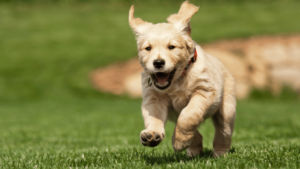Puppies are curious creatures that are slowly learning how to navigate the world. As expected, exploring big places can be overwhelming for a tiny pup. They can get anxious and excited really quickly, and these feelings can translate into chewing, biting, and whining! Like babies, they don’t completely have their faculties yet.
It’s hard to stop them from doing things the only way they know how to.
That’s why it’s important to train them while they’re still young. To build them a strong foundation for a well-behaved future.
Biting
Puppies investigate everything through nipping and biting. This mouthy behavior is normal and often seen during puppy play. However, if this continues to be enabled, this can become destructive and cause future aggression.
It’s best to start training a puppy that bites by understanding what causes it before it becomes an unbreakable habit.
Biting is often caused by attention-seeking, play, fear, or anxiety. For younger puppies, biting is worse during the uncomfortable stage of teething. One way to curb this behavior is by socializing– puppies like to play rough with their puppy playmates. Sometimes, one of them gets bitten too hard and will run away to stop playing. The biter is taken aback then realizes that biting can stop the fun! This is where they learn bite inhibition or the ability to control the force of their mouth. If puppies learn how to be gentle with each other, they can be gentle with their human friends too. Owners can use the same idea by letting out a sharp “ow!” if the puppy’s teeth touch their skin.
Other methods that can stop biting include crate training, obedience training, and time-outs. Whatever training tools and techniques are being used, they should be accompanied by positive reinforcement. Puppies tend to repeat acceptable behaviors that are regularly rewarded– punishment may work but they won’t understand what they did wrong. Even harsher punishments may worsen the unwanted behavior and produce more problems in the long run like aggression.
Whining
Unless a puppy is sick or in pain, whining is usually because they’re trying to communicate their needs and wants– they may be hungry, bored, stressed, or excited. During crate training, whining can be heard throughout the night in the first few weeks. Sometimes, puppies whine for no reason at all! There’s no way to tell with these furballs, especially for first-time dog parents.
It’s undeniable that excessive whining can get loud and annoying, so here are a few things to do to stop this behavior:
- Check for signs of pain or discomfort – the dog might be whining from pain or illness, so observe carefully and take it to the vet immediately for further assessment.
- Ignore the whining – puppy whining during crate training is something dog owners have to deal with. However, it would be a mistake to make it stop! Avoid letting them out of the crate or giving them what they want as this can reinforce the behavior. Instead, the goal is to teach the puppy that being calm and quiet will give better results.
- Make sure they’re properly stimulated – a bored puppy will crave attention and fun, so make sure they have enough playtime and exercise. Chances are, they’ll be too tired to even keep whining afterward.
- Schedule potty time and feeding – feed them and let them out to use the bathroom on a set schedule. That way, their needs will be more predictable and they will be less likely to whine to get attention.
Potty Training
Potty training a puppy should be a dog owner’s priority. The length of the process varies depending on age, breed, and environment. However, it’s important to remember that positive reinforcement yields better results than punishment. A good owner understands that successful housebreaking takes patience and kindness!
That said, potty training takes time and consistency. Accidents will happen, but that doesn’t mean it’s back to square one. Here is a list of Do’s and Don’ts to avoid common mistakes and make the process a bit easier:
Do’s of Potty Training
- Set a schedule for feeding whether it may be two or three meals a day. This can make a puppy’s bathroom break easier to predict. Letting them out shortly after a meal should be the most ideal time.
- Crate training is one of the most effective ways to potty train a puppy. They should be inside the crate during naptime and let out for potty breaks. Remember not to use the crate for punishment or this will make them avoid being in it all together.
- Use a leash for controlled potty breaks instead of letting them loose. Potty training should be a supervised task to ensure proper behavior. This will create the divide between training and playtime, just so they won’t confuse the two.
Don’ts of Potty Training
- Punishing a puppy for accidents will never guarantee good behavior, so this is a major NO. A fearful dog will continue to do unacceptable behavior so instead, utilize positive reinforcement. Reward with praise, treats, or toys when they deserve it.
- Allowing them access to food and water before bedtime will leave them with a full tummy. Puppies may end up relieving themselves inside the crate and defeat the whole purpose of crate training. Don’t feed them at least a few hours before, this will prolong the time before they need to go potty.
- Leaving them inside the crate for more than 4-6 hours does more harm than good. A young puppy does not have full control of their bladder– denying them potty breaks completely halts the process. They may even end up going to the bathroom in the house or inside the crate. They should be let out 1-2 times at night until they can handle longer hours without needing to go.
Good Training Makes An Even Better Dog
It’s not always easy to master the basics of puppy training. No matter the breed or age, successful training is going to need a lot of patience. There may not be one best way to train a puppy but doing it with love can help this journey tremendously. Following the right tips and tricks from experts will also make a world of a difference. As do all things that require effort, results, in the end, will always be rewarding if done correctly. Remember that how a puppy grows up is determined by the owner– so grab every chance to do it right.


